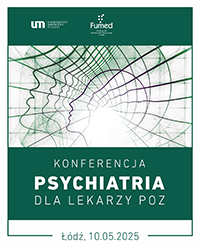A psychometric analysis of the Polish version of the Defense Style Questionnaire (DSQ-40) in a nonclinical sample of young adults
Marta Mrozowicz-Wrońska
 Affiliacja i adres do korespondencji
Affiliacja i adres do korespondencjiAim of the study: The Polish version of the Defense Style Questionnaire (DSQ-40) is one of the tools used by Polish researchers for measuring the maturity of defense mechanisms. Its psychometric characteristics were assessed in the study. Materials and methods: An analysis of reliability and a principal components analysis were performed for the results of the Polish version of DSQ-40 in a nonclinical sample (n = 341) of young adults. Results: The Cronbach’s alpha was slightly lower compared to the alpha for the original DSQ-40 questionnaire and exceeded 0.70 only for the immature factor. Calculating the alpha coefficient for each scale separately yielded diverse results: from alpha exceeding 0.80 for Autistic fantasy to a negative value for Devaluation. Very similar results were obtained by calculating the Spearman–Brown coefficient. Between items correlations for most of the scales were statistically significant but lower than r = 0.50. The correlation was high (r = 0.70) only for Autistic fantasy. The correlations for Devaluation, Denial and Splitting were statistically insignificant. Only for four out of 40 items, the item-factor correlation was higher than r = 0.40 while it did not exceed r = 0.10 in the case of five other items. The principal components analysis revealed a five-factor structure which explained 51.19% of the total variance. Conclusions: The Polish version of DSQ-40 offers an easy, practical way of measuring maturity of defense mechanisms, however, its reliability is problematic.






















